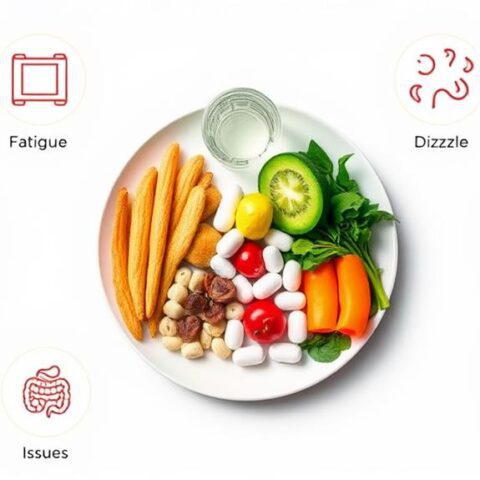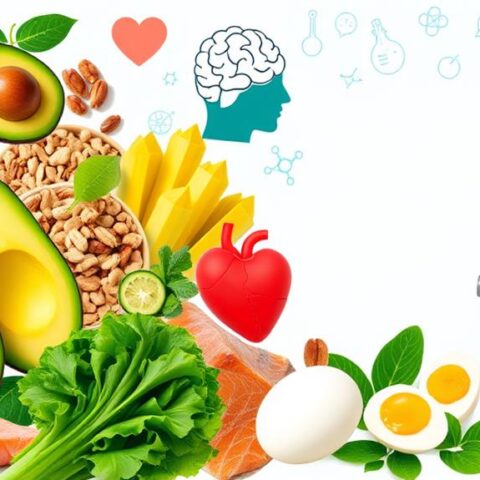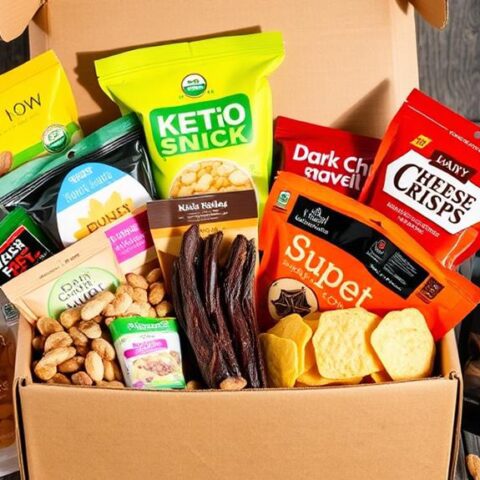
Consuming sugar on a keto diet disrupts ketosis by halting ketone production, redirecting energy from fats to carbohydrates, and promoting fat storage due to increased insulin levels. This disruption leads to blood glucose spikes, rapid insulin surges, and energy crashes, compromising metabolic stability. High sugar intake also escalates cravings and hunger through hormonal imbalances, negatively affecting appetite regulation. Weight loss efforts stall as the body prioritizes burning carbohydrates over fats. To recover, limit daily carbohydrate intake between 20-50 grams, consider sugar substitutes, and engage in physical activity. Explore strategies for maintaining ketosis and overcoming these sugar-induced challenges.
Key Takeaways
- Sugar consumption halts ketone production and disrupts ketosis.
- Insulin spikes from sugar intake redirect energy use from fats to carbohydrates.
- Rapid blood sugar fluctuations from sugar induce hunger and cravings.
- Excess sugar can lead to calorie overconsumption and hinder weight loss.
- Returning to ketosis after sugar intake may take several days.
Impact on Ketosis
Consuming sugar can considerably disrupt the state of ketosis, a significant element of the ketogenic diet. Ketosis relies on the body's ability to produce ketones by breaking down fats, a process that is halted when sugar is consumed.
Even a single high-sugar meal can drastically affect ketone production, redirecting the body's energy source from fats back to carbohydrates. This shift is primarily due to the body's insulin response to sugar intake. As blood glucose levels rise, insulin is released to manage the glucose, leading to a reduction in fat burning and promoting fat storage instead.
The ketogenic diet typically maintains daily carbohydrate intake between 20-50 grams to sustain ketosis. Consuming sugar contributes directly to this carbohydrate total, often exceeding the limit and jeopardizing the diet's effectiveness.
Once sugar is consumed, it can take several days of returning to a low-carb diet to resume ideal ketone production. It is vital to be mindful of sugar intake on a ketogenic diet, not only to maintain metabolic states but to avoid the physiological and metabolic consequences associated with the disruption of ketosis.
Consistent adherence to carbohydrate limits is essential for maintaining the benefits of the ketogenic lifestyle.
Blood Sugar Fluctuations
A shift from the impact on ketosis to the implications of sugar intake on blood sugar levels reveals further challenges for those adhering to a ketogenic diet. When individuals on a keto diet consume sugar, it can cause significant spikes in blood glucose, resulting in hyperglycemia. This condition disrupts the metabolic state of ketosis, as the body temporarily halts ketone production and reverts to using glucose as its primary energy source.
Such fluctuations in blood sugar can initiate an insulin response, leading to rapid insulin surges. These surges are often followed by energy crashes, which can undermine the stability of the ketogenic regimen and complicate efforts to maintain consistent energy levels. Furthermore, ongoing adherence to the ketogenic diet supports steady blood sugar levels, which is vital as any sugar intake can upend this stability.
Additionally, the volatility in blood sugar levels can trigger the release of stress hormones, particularly cortisol. Raised cortisol levels can further complicate weight management efforts due to their role in increasing appetite and promoting fat storage.
Consequently, for individuals on a ketogenic diet, maintaining a low-sugar intake is essential. It helps stabilize insulin levels and prevent the cycle of energy crashes and hormonal imbalances, which can disrupt the diet's effectiveness and contribute to challenges in adhering to its guidelines.
Cravings and Hunger
Cravings can pose a considerable challenge for individuals adhering to a ketogenic diet, particularly when sugar is consumed. When sugar is ingested, it can result in rapid fluctuations in blood glucose levels, leading to subsequent crashes that stimulate the body's hunger signals.
This fluctuation disrupts the hormonal balance, particularly insulin, which plays a vital role in regulating appetite. A hormone imbalance in insulin can lead to increased appetite and potential overeating, making it difficult to sustain ketosis.
Additionally, sugar can activate brain reward pathways similarly to addictive substances, contributing to sugar addiction. This phenomenon can enhance cravings for high-carb or sugary foods, creating a challenging cycle for individuals trying to maintain a keto diet.
Regular consumption of sugar diminishes the body's ability to stabilize insulin levels, fostering frequent hunger sensations and an increased desire for carbohydrates. Engaging in enjoyable activities can distract from cravings, helping to break this cycle.
This cycle of sugar addiction and hormone imbalance can greatly derail the adherence to a ketogenic dietary regimen. Understanding these physiological responses is essential for individuals on a keto diet to effectively manage cravings and avoid the pitfalls of sugar consumption, thereby maintaining a stable state of ketosis and achieving ideal dietary outcomes.
Weight Loss Challenges
While managing cravings is a significant hurdle on a keto diet, the impact of sugar consumption extends beyond just hunger and directly influences weight loss efforts. Consuming sugar can disrupt the delicate metabolic balance essential for ketosis, leading to a temporary cessation in ketone production. This interruption is significant because ketosis is essential for maximizing fat burning.
When a single high-sugar meal exceeds the standard daily carb limit of 20-50 grams, it can cause the body to revert to burning carbohydrates instead of fats, thereby undermining weight loss objectives. The introduction of sugar can also lead to plateau effects, where weight loss stalls due to increased insulin levels and subsequent fat storage. Such physiological responses complicate metabolic adaptation, a process where the body efficiently utilizes fats as the primary energy source.
In addition, sugar intake often triggers cravings, leading to overconsumption of calories and further complicating adherence to the keto diet's low-carb principles. Additional challenges could arise due to the "keto flu," which includes symptoms like fatigue and nausea during the initial phase of the diet.
The psychological cycle of cravings induced by sugar consumption can also amplify weight loss challenges, creating setbacks that hinder long-term commitment to dietary goals. Ultimately, meticulous monitoring of sugar intake is critical to avoid these adverse effects and maintain effective weight loss on a keto diet.
Strategies to Recover
Steering a recovery from sugar consumption on a keto diet requires strategic adjustments to swiftly return to ketosis. Initially, it is imperative to reduce carbohydrate intake back to the ideal 20-50 grams daily, thereby encouraging the body to prioritize fat burning once more. Implementing sugar substitutes such as erythritol or stevia can aid in curbing cravings without the risk of spiking glucose levels.
Hydration plays an essential role in recovery. Adequate water consumption helps flush out excess sugars and minimizes water retention. Consider these hydration tips: aim for at least eight glasses of water daily, include electrolytes to maintain balance, and avoid sugary beverages.
| Recovery Strategy | Description | Benefit |
|---|---|---|
| Carbohydrate Limit | Reduce to 20-50 grams per day | Promotes ketosis |
| Sugar Substitutes | Use erythritol or stevia | Reduces cravings |
| Hydration Tips | Drink 8+ glasses, add electrolytes | Flushes sugars, maintains balance |
| Physical Activity | Engage in regular exercise | Depletes glycogen, boosts ketones |
| Intermittent Fasting | Fast periodically | Uses stored fat for energy |
Engaging in physical activity further assists by depleting glycogen stores, thereby expediting ketosis. Additionally, intermittent fasting can be a valuable tool, enhancing the shift by utilizing stored fat during fasting intervals. Following these strategies will set a path for effective recovery and sustained dietary success.
Frequently Asked Questions
Will Eating Sugar Kick You Out of Ketosis?
Consuming sugar disrupts ketosis balance by impacting sugar metabolism, often exceeding carbohydrate limits, halting ketone production, and shifting energy reliance back to carbohydrates. Individual metabolic responses vary, but re-entering ketosis may require several days of strict low-carb adherence.
How Much Sugar Is Okay on Keto?
To maintain ketosis, sugar intake should be minimized. Utilizing sugar alternatives with minimal carbohydrate content is recommended. Regular ketone testing can provide clear guidance on their impact on ketosis, ensuring dietary goals align with metabolic needs.
Will One Piece of Candy Kick Me Out of Ketosis?
One piece of candy may disrupt ketosis, as it can exceed carbohydrate limits, triggering cravings. To mitigate this, consider sugar substitutes that align with keto guidelines, maintaining ketone production and reducing the risk of additional carbohydrate consumption.
What Happens if You Have a Cheat Day on Keto?
A cheat day on keto can raise blood sugar levels, disrupt ketosis, and induce sugar cravings. These effects may delay fat burning, promote water weight gain, and create psychological hurdles, complicating long-term adherence to the ketogenic diet.
Conclusion
Incorporating sugar into a ketogenic diet can disrupt ketosis, leading to increased blood sugar levels and potential fluctuations. Such changes may result in intensified cravings and hunger, thereby posing challenges to weight loss efforts. To mitigate these effects, it is advisable to promptly resume a low-carbohydrate regimen, increase physical activity, and monitor macronutrient intake. These strategies can aid in re-establishing ketosis and minimizing the adverse impacts on metabolic stability and weight management objectives.









No Comments